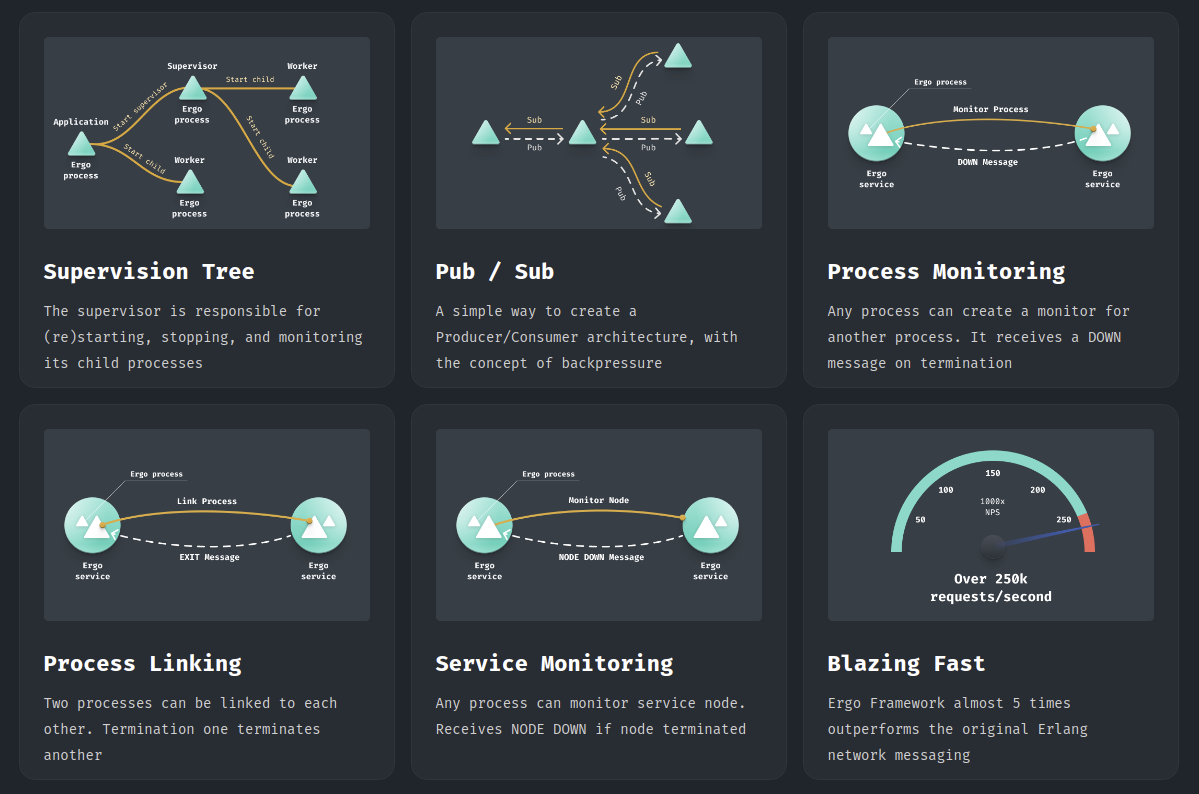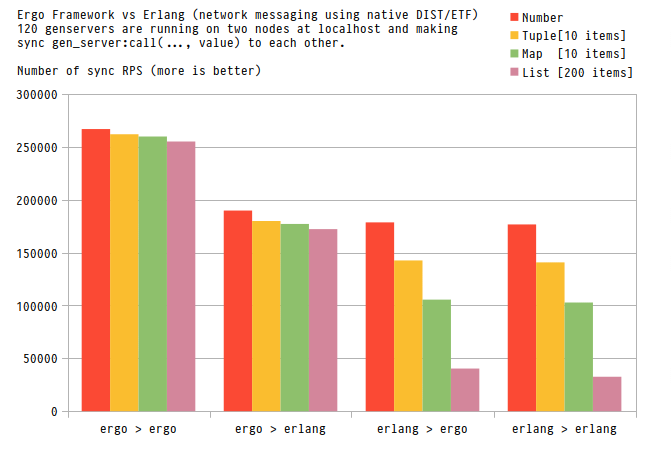





Technologies and design patterns of Erlang/OTP have been proven over the years. Now in Golang.
Up to x5 times faster than original Erlang/OTP in terms of network messaging.
The easiest way to create an OTP-designed application in Golang.
https://ergo.services
Purpose
The goal of this project is to leverage Erlang/OTP experience with Golang performance. Ergo Framework implements DIST protocol, ETF data format and OTP design patterns gen.Server, gen.Supervisor, gen.Application which makes you able to create distributed, high performance and reliable microservice solutions having native integration with Erlang infrastructure
Features

- Support Erlang 24 (including Alias and Remote Spawn features)
- Spawn Erlang-like processes
- Register/unregister processes with simple atom
gen.Server behavior support (with atomic state)gen.Supervisor behavior support with all known restart strategies support
- One For One
- One For All
- Rest For One
- Simple One For One
gen.Application behavior support with all known starting types support
- Permanent
- Temporary
- Transient
gen.Stage behavior support (originated from Elixir's GenStage). This is abstraction built on top of gen.Server to provide a simple way to create a distributed Producer/Consumer architecture, while automatically managing the concept of backpressure. This implementation is fully compatible with Elixir's GenStage. Example is here examples/genstage or just run go run ./examples/genstage to see it in actiongen.Saga behavior support. It implements Saga design pattern - a sequence of transactions that updates each service state and publishes the result (or cancels the transaction or triggers the next transaction step). gen.Saga also provides a feature of interim results (can be used as transaction progress or as a part of pipeline processing), time deadline (to limit transaction lifespan), two-phase commit (to make distributed transaction atomic). Here is example examples/gensaga.- Connect to (accept connection from) any Erlang node within a cluster
- Making sync request
ServerProcess.Call, async - ServerProcess.Cast or Process.Send in fashion of gen_server:call, gen_server:cast, erlang:send accordingly
- Monitor processes/nodes
- local -> local
- local -> remote
- remote -> local
- Link processes
- local <-> local
- local <-> remote
- remote <-> local
- RPC callbacks support
- embedded EPMD (in order to get rid of erlang' dependencies)
- Experimental observer support
- Unmarshalling terms into the struct using
etf.TermIntoStruct, etf.TermProplistIntoStruct or to the string using etf.TermToString
- Custom marshaling/unmarshaling via
Marshal and Unmarshal interfaces
- Encryption (TLS 1.3) support (including autogenerating self-signed certificates)
- Tested and confirmed support Windows, Darwin (MacOS), Linux, FreeBSD.
Requirements
Versioning
Golang introduced v2 rule a while ago to solve complicated dependency issues. We found this solution very controversial and there is still a lot of discussion around it. So, we decided to keep the old way for the versioning, but have to use the git tag versioning with v1 as a major version (due to "v2 rule" restrictions) . As a starting point for the v2.0.0 we use git tag v1.999.200. Since now, the only "patch version" will be increased for the next releases (e.g. v2.0.1 will be tagged in git as v.1.999.201 and so on, but never be above git tag v1.999 until the moment when Golang developers change the versioning approach)
Changelog
Here are the changes of latest release. For more details see the ChangeLog
v2.0.0 2021-10-12 [tag version v1.999.200]
- Added support of Erlang/OTP 24 (including Alias feature and Remote Spawn introduced in Erlang/OTP 23)
- Important: This release includes refined API (without backward compatibility) for a more convenient way to create OTP-designed microservices. Make sure to update your code.
- Important: Project repository has been moved to https://github.com/ergo-services/ergo. It is still available on the old URL https://github.com/halturin/ergo and GitHub will redirect all requests to the new one (thanks to GitHub for this feature).
- Introduced new behavior
gen.Saga. It implements Saga design pattern - a sequence of transactions that updates each service state and publishes the result (or cancels the transaction or triggers the next transaction step). gen.Saga also provides a feature of interim results (can be used as transaction progress or as a part of pipeline processing), time deadline (to limit transaction lifespan), two-phase commit (to make distributed transaction atomic). Here is example examples/gensaga.
- Introduced new methods
Process.Direct and Process.DirectWithTimeout to make direct request to the actor (gen.Server or inherited object). If an actor has no implementation of HandleDirect callback it returns ErrUnsupportedRequest as a error.
- Introduced new callback
HandleDirect in the gen.Server interface as a handler for requests made by Process.Direct or Process.DirectWithTimeout. It should be easy to interact with actors from outside.
- Introduced new types intended to be used to interact with Erlang/Elixir
etf.ListImproper to support improper lists like [a|b] (a cons cell).etf.String (an alias for the Golang string) encodes as a binary in order to support Elixir string type (which is binary() type)etf.Charlist (an alias for the Golang string) encodes as a list of chars []rune in order to support Erlang string type (which is charlist() type)
- Introduced new methods
Node.ProvideRemoteSpawn, Node.RevokeRemoteSpawn, Process.RemoteSpawn.
- Introduced new interfaces
Marshaler (method MarshalETF) and Unmarshaler (method UnmarshalETF) for the custom encoding/decoding data.
- Improved performance for the local messaging (up to 3 times for some cases)
- Added example examples/http to demonsrate how HTTP server can be integrated into the Ergo node.
- Added example examples/gendemo - how to create a custom behavior (design pattern) on top of the
gen.Server. Take inspiration from the gen/stage.go or gen/saga.go design patterns.
- Added support FreeBSD, OpenBSD, NetBSD, DragonFly.
- Fixed RPC issue #45
- Fixed internal timer issue #48
- Fixed memory leaks #53
- Fixed double panic issue #52
- Fixed Atom Cache race conditioned issue #54
- Fixed ETF encoder issues #64 #66
Benchmarks
Here is simple EndToEnd test demonstrates performance of messaging subsystem
Sequential Process.Call using two processes running on a single and two nodes
Hardware: laptop with Intel(R) Core(TM) i5-8265U (4 cores. 8 with HT)
❯❯❯❯ go test -bench=NodeSequential -run=XXX -benchtime=10s
goos: linux
goarch: amd64
pkg: github.com/ergo-services/ergo
BenchmarkNodeSequential/number-8 256108 48578 ns/op
BenchmarkNodeSequential/string-8 266906 51531 ns/op
BenchmarkNodeSequential/tuple_(PID)-8 233700 58192 ns/op
BenchmarkNodeSequential/binary_1MB-8 5617 2092495 ns/op
BenchmarkNodeSequentialSingleNode/number-8 2527580 4857 ns/op
BenchmarkNodeSequentialSingleNode/string-8 2519410 4760 ns/op
BenchmarkNodeSequentialSingleNode/tuple_(PID)-8 2524701 4757 ns/op
BenchmarkNodeSequentialSingleNode/binary_1MB-8 2521370 4758 ns/op
PASS
ok github.com/ergo-services/ergo 120.720s
it means Ergo Framework provides around 25.000 sync requests per second via localhost for simple data and around 4Gbit/sec for 1MB messages
Parallel Process.Call using 120 pairs of processes running on a single and two nodes
Hardware: workstation with AMD Ryzen Threadripper 3970X (64) @ 3.700GHz
❯❯❯❯ go test -bench=NodeParallel -run=XXX -benchtime=10s
goos: linux
goarch: amd64
pkg: github.com/ergo-services/ergo/tests
cpu: AMD Ryzen Threadripper 3970X 32-Core Processor
BenchmarkNodeParallel-64 4922430 2440 ns/op
BenchmarkNodeParallelSingleNode-64 16293586 810.0 ns/op
PASS
ok github.com/ergo-services/ergo/tests 29.596s
these numbers show almost 500.000 sync requests per second for the network messaging via localhost and 1.600.000 sync requests per second for the local messaging (within a node).
Ergo Framework vs original Erlang/OTP
Hardware: laptop with Intel(R) Core(TM) i5-8265U (4 cores. 8 with HT)

sources of these benchmarks are here
EPMD
Ergo Framework has embedded EPMD implementation in order to run your node without external epmd process needs. By default, it works as a client with erlang' epmd daemon or others ergo's nodes either.
The one thing that makes embedded EPMD different is the behavior of handling connection hangs - if ergo' node is running as an EPMD client and lost connection, it tries either to run its own embedded EPMD service or to restore the lost connection.
Observer
It's a standard Erlang tool. Observer is a graphical tool for observing the characteristics of Erlang systems. The tool Observer displays system information, application supervisor trees, process information.
Here you can see this feature in action using one of the examples:

Examples
Code below is a simple implementation of gen.Server pattern examples/simple
package main
import (
"fmt"
"time"
"github.com/ergo-services/ergo"
"github.com/ergo-services/ergo/etf"
"github.com/ergo-services/ergo/gen"
"github.com/ergo-services/ergo/node"
)
// simple implementation of Server
type simple struct {
gen.Server
}
func (s *simple) HandleInfo(process *gen.ServerProcess, message etf.Term) gen.ServerStatus {
value := message.(int)
fmt.Printf("HandleInfo: %#v \n", message)
if value > 104 {
return gen.ServerStatusStop
}
// sending message with delay
process.SendAfter(process.Self(), value+1, time.Duration(1*time.Second))
return gen.ServerStatusOK
}
func main() {
// create a new node
node, _ := ergo.StartNode("node@localhost", "cookies", node.Options{})
// spawn a new process of gen.Server
process, _ := node.Spawn("gs1", gen.ProcessOptions{}, &simple{})
// send a message to itself
process.Send(process.Self(), 100)
// wait for the process termination.
process.Wait()
fmt.Println("exited")
node.Stop()
}
here is output of this code
$ go run ./examples/simple
HandleInfo: 100
HandleInfo: 101
HandleInfo: 102
HandleInfo: 103
HandleInfo: 104
HandleInfo: 105
exited
See examples/ for more details
Elixir Phoenix Users
Users of the Elixir Phoenix framework might encounter timeouts when trying to connect a Phoenix node
to an ergo node. The reason is that, in addition to global_name_server and net_kernel,
Phoenix attempts to broadcast messages to the pg2 PubSub handler
To work with Phoenix nodes, you must create and register a dedicated pg2 GenServer, and
spawn it inside your node. The spawning process must have "pg2" as a process name:
type Pg2GenServer struct {
gen.Server
}
func main() {
// ...
pg2 := &Pg2GenServer{}
node1, _ := ergo.StartNode("node1@localhost", "cookies", node.Options{})
process, _ := node1.Spawn("pg2", gen.ProcessOptions{}, pg2, nil)
// ...
}
Development and debugging
There are options already defined that you might want to use
-ergo.trace - enable extended debug info-ergo.norecover - disable panic catching
To enable Golang profiler just add --tags debug in your go run or go build like this:
go run --tags debug ./examples/genserver/demoGenServer.go
Now golang' profiler is available at http://localhost:9009/debug/pprof
To check test coverage:
go test -coverprofile=cover.out ./...
go tool cover -html=cover.out -o coverage.html
To run tests with cleaned test cache:
go vet
go clean -testcache
go test -v ./...
To run benchmarks:
go test -bench=Node -run=X -benchmem
Companies are using Ergo Framework



is your company using Ergo? add your company logo/name here
Commercial support
please, visit https://ergo.services for more information